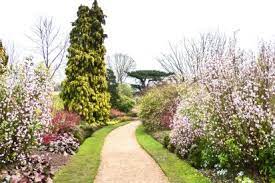
Delightful Daphnes in mixed planting
Daphens are a welcome addition to any early spring to mid summer garden, with fragment flowers over a long season and with attractive foliage and a compact habit. They are worth including in a planting scheme, particularly one near a path, so their gorgeous scent can really be enjoyed. Here are a few to consider.
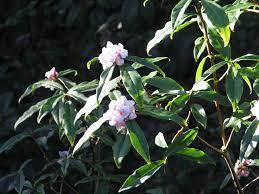
D. bholua’Gurkha’
D.bholua ‘Gurkha’: A medium sized shrub, with a dense upright habit with mid green foliage. Clusters of richly scented purple to white flowers are produced from December to February, plant in a sunny sheltered spot to get a, long flowering period. The flowers are followed by black fruits.
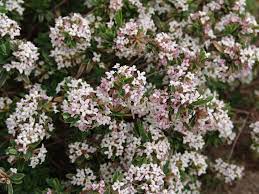
D. x ‘bankwodii’
D x burkwoodii: A small moderately slow growing shrub with compact habit and small whirls of evergreen foliage. Groups of pale pink flowers open white, with a good fragrance and are produced along the branches from May to June, it likes a sunny spot.
D.cneorum ‘Variegata’: A low growing prostate shrub, that makes good ground cover, with vargated evergreen foliage. It is a vigorous grower and is happy in semi-shade. Dark rose pink flowers are produced in clusters from April to May.
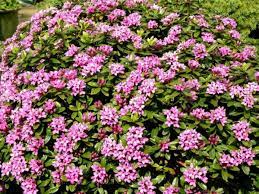
D. collina ‘neapolitana’
D.collina ‘neapolitana’: A compact moderately slow growing dwarf shrub, with mid green evergreen foliage, grows well in full sum. One of the darkest pink flowers of any Daphne, with good scent produced April to June.
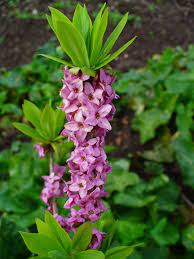
D. mezereum
D.mezereum: An upright small shrub, which needs full sun, it will cope well with growing on chalk. Flowers are produced up the stems in pink clusters and are highly scented, from February to March. Small orange poisonous berries follow.
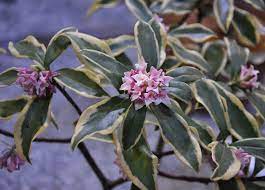
D. odora ‘Aureomarginata’
D.odora ‘Aureomarginata’: a beautiful small to medium shrub with long glossy emerald leaves with a creamy white edge. Scented clusters of waxy blush to white flowers are produced from February to early April, it will tolerate a chalky soil. Best grown in semi shade to full sun.
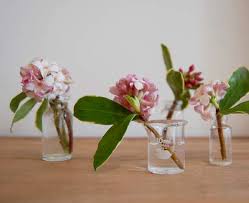
Bringing Daphnes indoors, to enjoy the scent.
Growing conditions: most Daphnes prefer semi-shade, although some do well in full sun. also as a rule they needs to be neutral to slightly acidic soil which is humus rich which has good moisture retention but is not water logged. The one big exception to this rule is Daphne odora, which will cope with an alkaline soil, but it still needs lots of compost and humus, it will not like drying out and very poor soils, so it will be important to make sure it dose not suffer from magnesium deficiency with yellowing leaves.
I hope you will be inspired to add these worth while shrubs to your next garden planting scheme.
